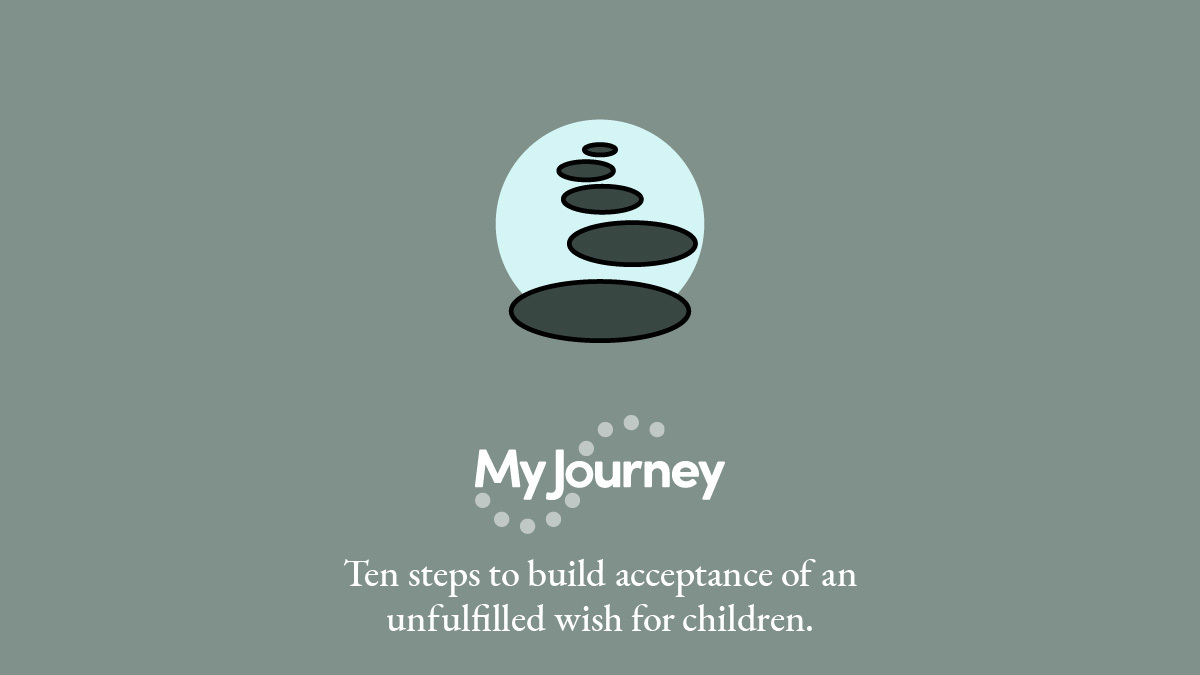
MyJourney was developed by Cardiff University Fertility Studies, in collaboration with the Portuguese Fertility Association and Fertility Network UK. It is research-based and user-led, with participation from health professionals and people who could not have the children they wished for. MyJourney is a self-help interactive program based on Contextual Cognitive Behavioural Therapy that provides step-by-step support to ease acceptance of an unfulfilled wish for children.
MyJourney is currently only accessible to participants who take part in a trial run by Cardiff Fertility Studies. To find out more about this trial and to take part please head to: http://myjourney.pt
MyJourney will be accessible to everyone from August 2021.
[i] This self-help guide was developed by Sofia Gameiro, Cardiff University.
It is based on multiple research studies conducted by Sofia Gameiro and collaborators (Gameiro & Finnigan, 2007; Gameiro et al, 2014, 2016; Gameiro, in prep) that account for the experience of more than 10,000 people. The quotes presented were retrieved from the primary qualitative research included in the Gameiro & Finnigan (2007) review. The exercises were developed by Sofia Gameiro, apart from when otherwise indicated.
Underpinning research:
Gameiro, S., & Finnigan, A. (2017). Long-term adjustment to unmet parenthood goals following ART: a systematic review and meta-analysis. Human Reproduction Update, 23(3), 322-337.
Gameiro, S., van den Belt-Dusebout, A. W., Bleiker, E., Braat, D., van Leeuwen, F. E., & Verhaak, C. M. (2014). Do children make you happier? Sustained child-wish and mental health in women 11-17 years after fertility treatment. Human Reproduction, 29(10), 2238-2246. doi:10.1093/humrep/deu178
Gameiro, S., van den Belt-Dusebout, A. W., Smeenk, J., Braat, D., van Leeuwen, F. E., & Verhaak, C. M. (2016). Women’s adjustment trajectories during IVF and impact on mental health 11-17 years later. Human Reproduction, 31(8), 1788-1798. doi:10.1093/humrep/dew131
Gameiro, S. (in prep). Adjustment to unmet parenthood goals: A test of the Three Tasks Model of Adjustment to Unmet Parenthood Goals.
Primary qualitative studies included in the Gameiro & Finnigan (2007) review:
Boden, J. (2007). When IVF treatment fails. Human Fertility, 10(2), 93-98.
Daniluk, J. C. (2001). Reconstructing their lives: A longitudinal, qualitative analyses of the transition to biological childlessness for infertile couples. Journal of Counselling and Development, 79(4), 439-449.
Johansson, M., & Berg, M. (2004). Women’s experiences of childlessness 2 years after the end of in vitro fertilization treatment. Scandinavian Journal of Caring Sciences, 19(1), 58-63.
Lee, G. L., Choi, W. H. H., C.H.Y., C., Chan, C. L. W., & Ng, E. H. Y. (2009). Life after unsuccessful IVF treatment in an assisted reproduction unit: A qualitative analysis of gains through loss among Chinese persons in Hong Kong. Human Reproduction, 24(8), 1920-1929.
McCarthy, M. P. (2008). Women’s lived experience of infertility after unsuccessful medical intervention. Journal of Midwifery & Women’s Health, 53(4), 319-324.
Su, T.-J., & Chen, Y.-C. (2006). Transforming hope: The lived experience of infertile women who terminated treatment after in Vitro Fertilization failure. Journal of Nursing Research, 14(1), 46-53.
Throsby, K. (2001). No one will ever call me Mummy: Making sense of the end of IVF treatment (Vol. 5, November). London: London School of Economics – Gender Institute.
Volgsten, H., Skoog-Svanberg, A., & Olsson, P. (2010). Unresolved grief in women and men in Sweden three years after undergoing unsuccessful in vitro fertilization treatment. Acta Obstericia et Gynecologica Scandinavica, 89(10), 1290-1297.
Wirtberg, I., Möller, A., Hogström, L., Tronstad, S.-E., & Lalos, A. (2007). Life 20 years after unsuccessful infertility treatment. Human Reproduction, 22(2), 598-604.